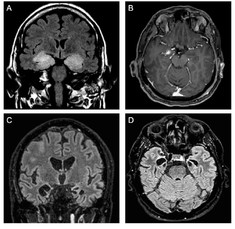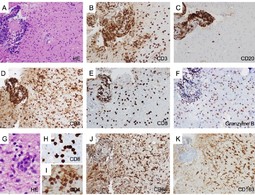Distinctive clinical presentation and pathogenic specificities of anti-AK5 encephalitis...
Limbic encephalitis (LE) with antibodies against adenylate kinase 5 (AK5) has been difficult to characterize because of its rarity. In this study, we identified 10 new cases and reviewed 16 previously reported patients, investigating clinical features, IgG subclasses, human leukocyte antigen (HLA), and CSF proteomic profiles. Patients with anti-AK5 LE were mostly men of median age 66 years old.
we compared the CSF proteomic profile of five anti-AK5 patients with that of 40 controls and 10 cases with other more common non-paraneoplastic LE (five with antibodies against leucine-rich glioma inactivated 1 and five against contactin-associated protein-like 2), as well as 10 cases with paraneoplastic neurological syndromes (five with antibodies against Yo and five against Ma2). These comparisons revealed, respectively, 31 and seven significantly up-regulated proteins in anti-AK5 LE, mapping to apoptosis pathways and innate/adaptive immune responses. These findings suggest that the clinical manifestations of anti-AK5 LE result from a distinct T-cell mediated pathogenesis, with major cytotoxicity-induced apoptosis leading to a prompt and aggressive neuronal loss, likely explaining the poor prognosis and response to immunotherapy.




